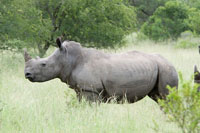The Department of Environmental Affairs has released the Rhino Issue Management (RIM) Report. The Rhino Issue Management Process, headed by former SANParks CEO Mavuso Masimang, took place during 2012. The release of the RIM report comes as the number of rhino poached in South Africa increased to 514.
The Kruger National Park continues to bear the brunt of poaching with 321 rhino poached since 1 January 2013, while 54 have been killed for their horns in Limpopo, 53 in North West and 43 in KwaZulu-Natal.
A total of 143 alleged poachers have been arrested this year.
Msimang and his team hosted 16 workshops, and 400 roundtable and one-on-one discussions to facilitate a common understanding of the challenges and opportunities relating to rhino conservation in the face of rhino poaching. The workshops and other processes were put in place to allow all stakeholders to collectively seek a solution to the devastating and escalating, internationally driven onslaught on the South African rhinoceros population.
The final report submitted to the minister and Department of Environmental Affairs in January 2013 has assisted the department in reviewing and updating its rhino response strategy outlined in the National Strategy for the Safety and Security of the Rhinoceros Population of South Africa (NSSSRPSA).
The RIM report incorporates current thinking on sustainable rhino conservation by acknowledged rhino specialists, ecologists and a range of other experts. It encapsulates view points from non-government organisations (NGO's) both specialised and community-based, civil society, and from traders, professional hunters, resource economists and ordinary citizens with a deep concern for the ethical and humane treatment of animals.
Conservation for the good of all humanity
The consultation process resulted in clear agreement that the country's rhinos should be conserved for the good of all humanity, and that every effort should be made to protect the threatened species from the sustained poaching onslaught by international syndicates earning huge profits from the sale of rhino horn.
While there were divergent views on the safety and security and trade in rhino horn, the recommendations take cognisance of the fact that not all positions could be satisfied. It is important to note that integral to the RIM team's findings is that there is no single solution to the rhino poaching scourge. Efforts will pragmatically require the employment of a range of strategies along several fronts.
The final recommendations were submitted to Cabinet in February 2013. Feasible recommendations were adopted. The recommendations were also submitted to the provincial MECs responsible for environmental affairs.
The RIM report does, however, state that there is support to include commercial international trade in rhino horn as an integral part of South Africa's comprehensive response strategy to address the continued illegal killing of rhinos.
This recommendation has formed part of the decision by the Cabinet that South Africa prepares and submits a rhino trade proposal for consideration at the 17th Conference of Parties of the Convention on International Trade in Endangered Species of Fauna and Flora (CITES) in 2016.
The decision to table the proposal to CITES COP17 is but one of the many interventions being undertaken by the government to address the ongoing scourge of rhino poaching.
All efforts to deal with the poaching crisis are not only aimed at protecting the threatened species from extinction, but also at securing the country's national security - threatened by incursions by armed poachers - as well as part of our natural heritage and the future of the country's tourism industry.
Download the RIM report.
| Rhino poaching statistics | | SA | 2010 | 2011 | 2012 | 2013 |
| KNP (SANParks) | 146 | 252 | 425 | 321 |
| MNP (SANParks) | 0 | 6 | 3 | 2 |
| GP | 15 | 9 | 1 | 3 |
| LIM | 52 | 74 | 59 | 54 |
| MP | 17 | 31 | 28 | 36 |
| NW | 57 | 21 | 77 | 53 |
| EC | 4 | 11 | 7 | 2 |
| FS | 3 | 4 | 0 | 0 |
| KZN | 38 | 34 | 66 | 43 |
| WC | 0 | 6 | 2 | 0 |
| NC | 1 | 0 | 0 | 0 |
| 333 | 448 | 668 | 514 |
| Rhino poaching arrests statistics | | South Africa - Arrests | 2013 | 2012 | 2011 | 2010 |
| KNP | 63 | 73 | 82 | 67 |
| MNP | 0 | 0 | 0 | 0 |
| Gauteng (GP) | 3 | 26 | 16 | 10 |
| Mpumalanga (MP) | 9 | 66 | 73 | 16 |
| Eastern Cape (EC) | 0 | 0 | 2 | 7 |
| Limpopo (LP) | 27 | 43 | 34 | 36 |
| North West (NW) | 11 | 32 | 21 | 2 |
| Free State (FS) | 0 | 6 | 0 | 0 |
| KwaZulu-Natal (KZN) | 30 | 20 | 4 | 25 |
| Western Cape (WC) | 0 | 0 | 0 | 2 |
| Northern Cape (NC) | 0 | 1 | 0 | 0 |
| Total | 143 | 267 | 232 | 165 |
South Africans are urged to report incidents of poaching and tip-offs to the anonymous tip-off lines 0800205005, 0860010111 or Crime-Line on 32211.






























